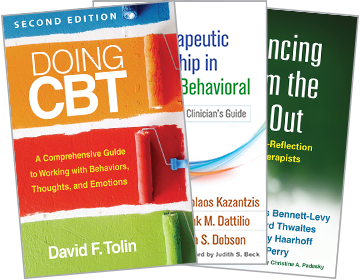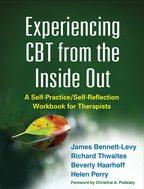Experiencing CBT from the Inside Out
A Self-Practice/Self-Reflection Workbook for Therapists
James Bennett-Levy, Richard Thwaites, Beverly Haarhoff, and Helen Perry
Foreword by Christine A. Padesky
A Paperback Originale-bookprint + e-book
A Paperback Original
orderJanuary 23, 2015
ISBN 9781462518890
Price: $47.00278 Pages
Size: 8" x 10½"
Check out a special package offer including this title!

The reproducible materials can be downloaded and printed in PDF format.
“As a reader, you are in good hands. The authors not only have used these methods themselves, they have guided hundreds of therapists through the process. The exercises, worksheets, and instructive text are all road-tested and designed to help you have the best experience possible using CBT for self-practice. The self-reflection exercises integrated into this book help you maximize your learning….Along the way, your efforts are likely to kindle new depths of meaning and new ways of being to help you become a better therapist and a happier person.”

—from the Foreword by Christine A. Padesky, PhD, Cofounder, Center for Cognitive Therapy, Huntington Beach, California
“This terrific book places the direct personal experience of CBT right at the heart of the training process. SP/SR has been an enduring passion for Bennett-Levy and his international team of authors for more than 15 years, and this steady commitment shines through in the book’s integration of clearly explained theory, evidence, and lucidly designed and written practical modules. Encouraging us to apply CBT concepts and methods to ourselves, the book highlights our common humanity—because we and our patients have the same imperfect human minds, and we too can liberate ourselves from unhelpful old patterns in just the same way. A radical and refreshing approach!”

—Melanie Fennell, PhD, Oxford Mindfulness Centre, Department of Psychiatry, University of Oxford, United Kingdom
“This workbook skillfully and compassionately walks mental health trainees and experienced practitioners alike through the steps of applying the evidence-based practices of CBT to themselves for professional and personal growth. Using well-crafted written and experiential exercises, Bennett-Levy et al. help the reader to recognize self-limiting 'old ways of being' and to develop and maintain 'new ways of being.' The result is an increase in empathy for clients who struggle with the therapeutic process (which is arduous!) and an enhanced congruency between what therapists offer their clients and how they live their own lives. The book will be of great benefit in graduate training, in group supervision, as a professional development project, or as part of a CBT retreat with colleagues.”

—Cory F. Newman, PhD, ABPP, Professor of Psychology in Psychiatry, and Director, Center for Cognitive Therapy, Perelman School of Medicine, University of Pennsylvania
“The authors have done CBT a great service. Good teachers know their subject inside out; therapists who use CBT tools to understand their own vulnerabilities and strengths—and change long-standing habits of thinking and behavior—will be better at teaching these tools to clients. Clients sense this authenticity. The authors show how to imbue CBT with compassion, humanity, and the humility that comes from direct experience of how hard change can be.”

—Willem Kuyken, PhD, Department of Psychiatry, University of Oxford, United Kingdom
“This book builds on what we already know about working with clients: learning through experience is far more valuable than being told something or reading about it. Of course, this principle applies just as much to the therapist. The book will likely be helpful to clinicians at all career stages who wish to improve their ability to help others or who are working with challenging clients.”

—Adam S. Radomsky, PhD, Department of Psychology, Concordia University, Canada
“I applaud the authors for this excellent book. CBT offers highly effective tools for change, but convincing clients to use them is not always easy. There is no doubt that personal practice with the techniques will enhance the therapist's ability to motivate clients. Therapists will be better able to respond to queries convincingly and preempt any problems in implementation. Importantly, SP/SR is likely to increase practitioners' empathy and respect for clients, thus enhancing the therapeutic alliance and improving outcomes.”

—Analise O'Donovan, PhD, School of Applied Psychology, Griffith University, Australia
“For years, we have been practicing and teaching CBT from the outside in: theoretical underpinnings, procedures, protocols, and techniques. At long last, we have a book that enhances CBT practice through a systematic process of self-practice and self-reflection. The authors have done an exceptional job of fostering an experiential journey through which understanding of the therapist's self and of patients can be developed via an emphasis on process, strengths, and culture. This book should be read by all CBT practitioners and trainers.”

—Chee-Wing Wong, PsychD, Departments of Psychiatry and Psychology, The Chinese University of Hong Kong
—from the Foreword by Christine A. Padesky, PhD, Cofounder, Center for Cognitive Therapy, Huntington Beach, California
“This terrific book places the direct personal experience of CBT right at the heart of the training process. SP/SR has been an enduring passion for Bennett-Levy and his international team of authors for more than 15 years, and this steady commitment shines through in the book’s integration of clearly explained theory, evidence, and lucidly designed and written practical modules. Encouraging us to apply CBT concepts and methods to ourselves, the book highlights our common humanity—because we and our patients have the same imperfect human minds, and we too can liberate ourselves from unhelpful old patterns in just the same way. A radical and refreshing approach!”
—Melanie Fennell, PhD, Oxford Mindfulness Centre, Department of Psychiatry, University of Oxford, United Kingdom
“This workbook skillfully and compassionately walks mental health trainees and experienced practitioners alike through the steps of applying the evidence-based practices of CBT to themselves for professional and personal growth. Using well-crafted written and experiential exercises, Bennett-Levy et al. help the reader to recognize self-limiting 'old ways of being' and to develop and maintain 'new ways of being.' The result is an increase in empathy for clients who struggle with the therapeutic process (which is arduous!) and an enhanced congruency between what therapists offer their clients and how they live their own lives. The book will be of great benefit in graduate training, in group supervision, as a professional development project, or as part of a CBT retreat with colleagues.”
—Cory F. Newman, PhD, ABPP, Professor of Psychology in Psychiatry, and Director, Center for Cognitive Therapy, Perelman School of Medicine, University of Pennsylvania
“The authors have done CBT a great service. Good teachers know their subject inside out; therapists who use CBT tools to understand their own vulnerabilities and strengths—and change long-standing habits of thinking and behavior—will be better at teaching these tools to clients. Clients sense this authenticity. The authors show how to imbue CBT with compassion, humanity, and the humility that comes from direct experience of how hard change can be.”
—Willem Kuyken, PhD, Department of Psychiatry, University of Oxford, United Kingdom
“This book builds on what we already know about working with clients: learning through experience is far more valuable than being told something or reading about it. Of course, this principle applies just as much to the therapist. The book will likely be helpful to clinicians at all career stages who wish to improve their ability to help others or who are working with challenging clients.”
—Adam S. Radomsky, PhD, Department of Psychology, Concordia University, Canada
“I applaud the authors for this excellent book. CBT offers highly effective tools for change, but convincing clients to use them is not always easy. There is no doubt that personal practice with the techniques will enhance the therapist's ability to motivate clients. Therapists will be better able to respond to queries convincingly and preempt any problems in implementation. Importantly, SP/SR is likely to increase practitioners' empathy and respect for clients, thus enhancing the therapeutic alliance and improving outcomes.”
—Analise O'Donovan, PhD, School of Applied Psychology, Griffith University, Australia
“For years, we have been practicing and teaching CBT from the outside in: theoretical underpinnings, procedures, protocols, and techniques. At long last, we have a book that enhances CBT practice through a systematic process of self-practice and self-reflection. The authors have done an exceptional job of fostering an experiential journey through which understanding of the therapist's self and of patients can be developed via an emphasis on process, strengths, and culture. This book should be read by all CBT practitioners and trainers.”
—Chee-Wing Wong, PsychD, Departments of Psychiatry and Psychology, The Chinese University of Hong Kong



